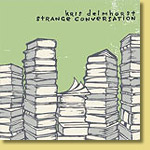 Yesterday, I caught the majority of an NPR interview with folk/singer songwriter Kris Delmhorst, who might just be one of my new favorites, if I can get my hands on a copy of her most recent CD Strange Conversations. She must have been an English major, or at least she has the soul of one. All the songs on her new album are taken from or were inspired by famous poems -- e.e. cummings "Pretty How Town" and Byron's "We'll Go No More A-Roving" as well as verses by Herrick, Eliot, and Edna St. Vincent Millay, among others. According to her website, "Some of the poems are set verbatim to music, some dismantled and reassembled in significantly new renditions, others merely used as the jumping-off point for Delmhorst's own literate lyrical take." Her sound seems to be a mix of folk, bluegrass, gospel, and everything in between.
Yesterday, I caught the majority of an NPR interview with folk/singer songwriter Kris Delmhorst, who might just be one of my new favorites, if I can get my hands on a copy of her most recent CD Strange Conversations. She must have been an English major, or at least she has the soul of one. All the songs on her new album are taken from or were inspired by famous poems -- e.e. cummings "Pretty How Town" and Byron's "We'll Go No More A-Roving" as well as verses by Herrick, Eliot, and Edna St. Vincent Millay, among others. According to her website, "Some of the poems are set verbatim to music, some dismantled and reassembled in significantly new renditions, others merely used as the jumping-off point for Delmhorst's own literate lyrical take." Her sound seems to be a mix of folk, bluegrass, gospel, and everything in between.In particular, this little ditty-- a song about a poem about listening to a song-- captured my attention immediately. It's catchy, upbeat and clever, and the opening reminds me of something Randall Goodgame might write.
Galuppi Baldassare
Oh Galuppi Baldassare, though I never knew your name,
it’s thanks to Mr. Browning you are with us just the same.
Thanks to Mr. Browning, blowing on the flame…
Well here you come with your old music, and here’s all the good it brings-
you say they lived like this in Venice when the merchants were the kings,
and though I never left old Boston, still you showed me everything
Did the young folks take their pleasure? Was the ocean warm in May?
Did the parties start at midnight, did they roll until midday?
And did the ladies bloom like bellflowers, every time you’d start to play?
Well I bet that they all loved you, I bet they stood around and cheered,
saying “that’s what I call music, good for joy and good for tears,
now let’s stop all this talking, and let it fill our ears.”
And the minor third so bitter, the six chord like a sigh,
suspension, solution, asking must we die, must we die must we die?
And the seventh says well fellas, life might not last, but we can try…
So were you happy? I was happy. You still happy? Yes, and you?
Then more kisses! Why’d we stop them, when a million seemed so few?
There’s something in that music, lord it must be answered to.
Then they left you for their fortune, in due time one by one.
Some had lives that came to nothing, some did things they’d better not have done,
and then death stepped up and took em where they’ll never see the sun…
Oh but you you ghostly cricket, singing where the house has burned,
‘dust and ashes, dead and done with, Venice spent what Venice earned,’
but what’s left behind I wonder, when the kissing has adjourned?
‘Dust and ashes,’ so you tell me, and I cannot say you’re wrong,
still those dear dead dancing ladies with their hair so soft and long
stir a little in their slumber, every time we play your song.
‘Cause the minor third’s still bitter, the six chord makes us sigh,
suspension, solution, asking must we die, must we also die?
And the seventh still says well, life might not last, but we can try…
Here's a link to the original poem, in case you're an English geek like me. Enjoy discovering a new artist. And thank you, NPR!
No comments:
Post a Comment